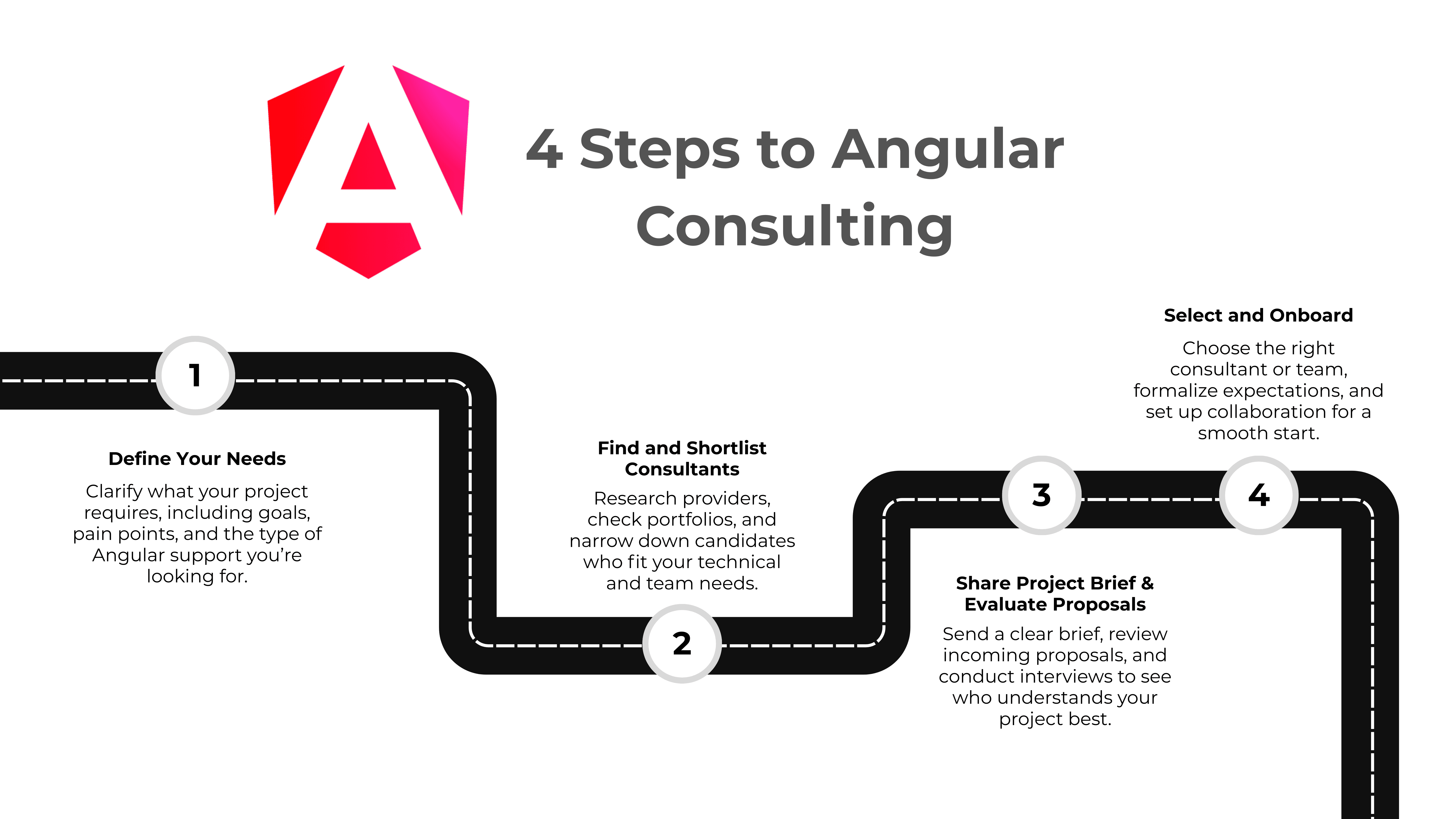How to Apply for Angular Consulting Services

About us
MoldoWEB is a software development company, located in Romania, specialized in providing outsourcing and team augmentation services for clients around the world.
Table of contents
- What is Angular Consulting?
- How to Get Started with Angular Consulting
- Onboarding and Collaboration Tips
- Conclusion
If you’ve been working with Angular for a while, or you’re just started exploring it, you’ve probably run into moments where your project could really use some extra help or expertise, even with a full development team. Angular can be quite complex, especially for those just starting out. So when it comes to more difficult tasks, like refactoring a complex app, optimizing performance, relying on Angular consulting can make a real difference.
So, what is Angular or software consulting about? In this article, we will take a look at this type of service and go through the right steps to take to work with an Angular consultant successfully.
What is Angular Consulting?
Even the best teams have coaches. And not because the players can’t play, but because a good team needs someone who focuses on the bigger picture and the overall strategy. That’s pretty much what Angular consulting is about: having a teammate that is not there to replace the devs, but to guide them, review the code, or suggest improvements.
Software consulting services come with plenty of advantages, but the best results come from working with a consultant who has the right expertise for your project.

How to Get Started with Angular Consulting
So, you’ve decided to bring in some extra Angular expertise. But where do you start? Jumping into contacting consultants without a plan might not be the best approach. It could end in vague proposals, mismatched expectations, or just wasted time.
The key is to break it down into steps. Coming up with a clear roadmap helps you find the right fit and get the most value out of the collaboration. We have a list below with the essential steps to apply for Angular consulting.
1. Understand Your Needs
This is probably the most important one. Working with consultants will be much more efficient if you figure out exactly what you need help with first. Angular can cover a lot of aspects of a project: from frontend architecture to state management to performance, and even best practices for maintainable, scalable code. So, be specific and define your needs and priorities before contacting potential Angular consultants.
2. Research Potential Angular Consulting Providers
Once you know what you need, it’s time to research and find people who can actually help you. Research Angular consultants, check out their portfolios along with case studies, and see whether they’ve worked on projects similar to yours. Client testimonials can give you some insights on how they work in real teams, besides just the technical knowledge.
3. Prepare Your Project Brief
Now that you have a list with a few potential consultants, the next thing to focus on is giving them the most important details of your project, aka a project brief. It’s basically about explaining what you’re building, the problems you want to solve, and what exactly you need help with. The most important details include your project goals, what you’re trying to achieve. Do you want to improve your app’s performance, launch faster, or clean up code? Make sure to be clear about your goals. Here, sharing your current tech setup and tools is also very important.
And lastly, don’t forget to include what success looks like for you. A well-prepared project brief helps the consultant give you directions and proposals that match your needs.
4. Reach Out and Request Proposals
A lot of teams overthink this step, but there’s no need to overcomplicate it. You can find most agencies’ contact forms on their website, along with an email or even a LinkedIn account. A clear message with your brief is usually enough to get things moving. However, don’t be afraid to ask important questions like:
-How would you approach this type of project?
-What’s your usual turnaround for proposals?
-Do you work best on a one-off basis, or as part of a longer engagement?
Your goal here is not just to get an offer or a price. In the initial discussions with potential consultants, it’s more about seeing how they communicate. Good consultants ask follow-up questions or suggest getting on a call to discuss the details. When someone just sends back a simple quote without anything else, that’s usually a red flag.
5. Evaluate Proposals and Conduct Interviews
Once you start getting proposals from different agencies, the first thing you should do is separate the solid ones from the “copy-paste” ones. Choose a few serious candidates and contact them for interviews.
Good Angular consulting agencies should give you a glimpse into how they think: do they suggest practical solutions or maybe raise questions you hadn’t considered? If they do, that’s usually a sign that they’ve actually done this before.
Technical skills are very important, so make sure to go over those during interviews. Some key questions to ask consultants should include whether they’ve worked on similar projects, how they handle code reviews and testing, and, of course, what their preferred way of collaborating is with the client’s teams.
Look for consultants that have the skills and expertise you’re looking for, but also someone who communicates clearly, solves problems, and makes your team’s life easier.
6. Select the Right Consultant or Team
After talking to potential consultants and looking at their proposals, it’s time to decide on the right one for your project.
Compare proposals side by side: consider experience, suggested solutions, and communication style, and how well they understand your goals and needs. Don’t forget about cultural fit: it can make a huge difference in collaboration.
Once you’ve made your choice, drawing up a formal agreement between you and your Angular consultant should be the next step. Here, you should include every important detail regarding the project and collaboration, such as responsibilities, timelines, and expectations.

Onboarding and Collaboration Tips
For everything to go smoothly from start to finish, prioritize making the onboarding process straightforward, so your project starts off on the right foot.
For this, start with a clear context. Share everything you need help with, your goals, your current codebase and setup, and any documentation that exists. The more your consultants understand upfront, the faster they can start contributing in a meaningful way.
This is an obvious one, but we cannot emphasize communication enough. Having worked with a number of different companies, we know from experience that a lack of good communication can make everything ten times harder and lead to misunderstandings. So, yeah, set up communication channels for both your team and consultants, like Slack, or Teams, whatever you prefer, and stick to it. Check in with your team regularly (short weekly calls usually do the trick) to keep track of progress and address any issues.
You’ll also want to set expectations early: deciding on how code reviews are handled, how tasks are tracked, and who is responsible for what in your team. This just helps avoid confusion and misunderstandings down the line.
The real value of a consultant comes from shared knowledge and continuous support in leveling up.
Conclusion
Software consulting services are becoming increasingly popular, especially for companies with established development teams that need extra guidance.
If you’re thinking about bringing in Angular expertise, treat it as an investment in doing things right from the start. And if you need a hand, our team at MoldoWEB is always ready to step in, share what we know, and help you build something solid.


